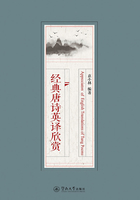
17.春夜喜雨
好雨知时节,当春乃发生。
随风潜入夜,润物细无声。
野径云俱黑,江船火独明。
晓看红湿处,花重锦官城。
中文解读
《春夜喜雨》是杜甫的名篇之一,为诗人于上元二年(761年)在成都草堂居住时所作。此诗运用拟人手法,以极大的喜悦之情细致地描绘了春雨的特点和成都夜雨的景象,热情地讴歌了来得及时、滋润万物的春雨。诗中对春雨的描写,体物精微,细腻生动,绘声绘形。全诗意境淡雅,意蕴清幽,诗境与画境浑然一体,是一首传神入化、别具风韵的咏雨诗。
这首诗写的是“雨”,诗人敏锐地抓住这场雨的特征,从各个方面进行描摹。前两句写了下雨的季节,直接赞美了这场雨的及时。雨仿佛知晓人们的心思,在最需要的时候悄然来临。后面六句集中写了“夜雨”,野外一片漆黑,只有一点渔火若隐若现。诗人于是兴奋地猜测:等到天明,锦官城里该是一片万紫千红了吧。诗中没有一个“喜”字,但从“潜”“润”“细”“湿”等字,都体现着诗人的喜悦之情。
白话译文
好雨似乎会挑选时节,降临在万物萌生之春。伴随和风,悄悄进入夜幕。
细细密密,滋润大地万物。浓浓乌云,笼罩田野小路;点点灯火闪烁江上渔船。明早再看带露的鲜花,成都满城必将繁花盛开。
英译一
Happy Rain on a Spring Night
Translated by Xu Yuanchong
Good rain knows its time right,
It will fall when comes spring.
With wind it steals in night,
Mute, it moistens each thing.
Over wild lanes dark cloud spreads,
In boat a lantern looms.
Dawn sees saturated reds,
The town's heavy with blooms.
(mute adj.无声的 moisten v.弄湿 loom v.若隐若现saturated adj.渗透的)
英译二
Rain in Spring Night
Translated by Gerling
The rain knows the time,
Knows it is spring and punctually comes.
With the wind it came quietly at night,
Came softly and silently to moisten all and helped them grow.
I walked down the wild road under the dark cloud,
And saw the only light from the boat.
In the morning I looked into the Jing city where it was red and wet,
And found flowers booming everywhere.
(punctually adv.准时地)
英译欣赏
This is one of the most famous poems that describes the happy mood at the sight of the rain in spring in Chinese history. The rain was not just a rain in the eyes of the poet but something with life, something with feelings.
这里所选英译一是许渊冲教授的翻译,英译二是Gerling的翻译。这是两种不同风格的翻译,英译一兼顾了诗歌的音律、用词和意境,再现了原诗的音美、形美和意美。同时,译文再现了杜诗的文体风格,紧贴英诗的语言特色,易为西方读者接受。
英译一采用abab, cdcd隔行押韵,虽与原诗不同,却符合英诗的押韵规则。
原诗用词大多浅显易懂,符合写景抒情特点,译文也采用通俗易懂的词语来表达原诗的意义。如名词rain、spring、wind、lanes、boat和lantern,一一再现原诗的事物。
英译一最大的特点是保留了原诗的拟人化色彩。比如题目,英译一happy rain on a spring night, “春夜快乐的雨”;英译二则译为rain in spring night, “在春夜的雨”,没有译出“喜”。
“好雨知时节,当春乃发生”:Good rain knows its time right, It will fall when comes spring。good rain 好像人一样,和“春”心灵相通,知道在春天来临时“发生”。
“随风潜入夜,润物细无声”:With wind it steals in night, Mute, it moistens each thing,这句可以这样理解:It steals with wind in night, It moistens each thing, mute。用steal 表达“潜”,仍是形象的拟人用法。用each thing来译“物”,意义准确。mute,是形容词充当伴随行为状语。
“野径云俱黑,江船火独明”:Over wild lanes dark cloud spreads, In boat a lantern looms,这是倒装句,应为:Dark cloud spreads over wild lanes, a lantern looms in boat。
“晓看红湿处”:Dawn sees saturated reds,这里dawn(拂晓)就像有生命的人,可以看见被雨渗透的红色。dawn sees是拟人化用法。
“花重锦官城”:The town's heavy with blooms, blooms是名词,意指花朵,be heavy with指有大量的,很多的。“整个城有着大量的花朵。”岂不就是“花重锦官城”吗?
英译二是比较典型的西方翻译,译成散体诗,也是拟人化译法,好像在讲故事,主角就是the rain。The rain knows the time, Knows it is spring and punctually comes。
第三、四句是一个递进式长句:With the wind it came quietly at night, Came softly and silently to moisten all and helped them grow。主语it指代the rain,这句和英译一异曲同工。三个副词quietly、softly and silently,似乎在一步一步递进。
第五、六句动作的主语变成了I(我):I walked down the wild road under the dark cloud, And saw the only light from the boat。
接着,我还在看,还在感受:In the morning I looked into the Jing city where it was red and wet, And found flowers booming everywhere。清晨我看看红湿的锦官城,发现到处花儿开。句中where it was red and wet 为定语从句,修饰前面的the Jing city。
Gerling 作为外国人,似乎不太了解成都在春雨过后,不只是花开,还有花儿都被淋湿了。
思考
“锦官城”英译一译为the town,英译二译为the Jing city,也有人译成Chengdu,哪个更好?